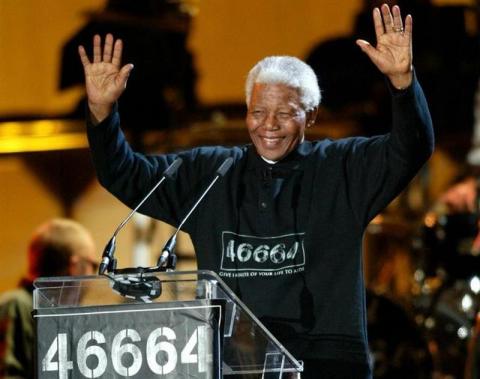Advertisement
Invisible In Prison, Mandela Was Kept In Spotlight By Music
JOHANNESBURG (Reuters) - For nearly three decades, very few people except prison guards and fellow inmates knew what Nelson Mandela looked like.
But his imprisonment and the fight against the apartheid government in South Africa was kept on the world stage by music - from ska and reggae songs to jazz - with one common message:
Free Nelson Mandela.
Now, after his death on Thursday at the age of 95, many of the songs that became a soundtrack to the anti-apartheid struggle in the 1980s are back on the airwaves, adding to the chorus of global tributes to the beloved statesman.
They are being played and replayed as South Africa commemorates its first black president with a memorial ceremony on Tuesday to be attended by a host of global leaders.
After his release from 27 years in apartheid jails in 1990, Mandela attended countless concerts held in his honour, and in later years musical events to promote his 46664 Aids charity - named after his old prisoner number.
"It is music and dancing that makes me at peace with the world and at peace with myself," Mandela said in 1999 after joining South African singer Johnny Clegg - the "White Zulu" - on stage in France.
He urged the French crowd to dance to Clegg's anti-apartheid song "Asimbonanga" ('We have not seen him' in Zulu) and gently swayed doing his trademark dance, dubbed the Madiba Shuffle. Madiba is Mandela's clan name.
From reggae singer legend Eddy Grant with "Gimme Hope Jo'Anna" to jazz great Hugh Masekela with "Bring Him Back Home", musicians composed and dedicated songs to Mandela and the anti-apartheid struggle.
Exiled South African musicians like Masekela, and the late Miriam Makeba - or "Mama Africa" as she was known - kept up pressure on the apartheid government through their music.
Makeba, known for songs like "Pata, Pata" and "A Luta Continua", addressed the U.N. Special Committee on apartheid several times. Before and after Mandela's release she was one of first performers to be asked to appear at music concerts in his honour.
Before the end of apartheid in 1994, one thing most Mandela songs had in common is they were almost universally banned by the then white minority government.
Despite the bans, songs often became powerful weapons in the fight against racial segregation.
Clegg told Talk Radio 702 that activists copied and distributed "Asimbonanga", which he wrote in 1986 at the height of South Africa's state of emergency when protesters fought pitched battles with police and the army in the black townships.
"It became a very popular song at UDF (the ANC's internal wing) meetings and at burials of activists who had been shot (by police) during that period," Clegg said.
One of the most famed songs was "Free Nelson Mandela", written by Jerry Dammers and performed by his band the British ska group the Special A.K.A. Although banned in South Africa, it was played at football matches in the black townships and was an international hit.
MOBBED
Dammers was instrumental in organising the 70th Birthday Tribute to Mandela at London's Wembley Stadium in June 1988, while Mandela was still in jail.
The event, whose line-up included Sting, Stevie Wonder, Jackson Browne and anti-apartheid campaigner Steven Van Zandt, was broadcast to a global audience of millions and did much to raise awareness of Mandela's incarceration.
A second Wembley concert was staged in 1990 to celebrate Mandela's release, featuring among others Lou Reed, Tracy Chapman and Neil Young.
"He went from being in prison to being mobbed. When he came on stage, the standing ovation lasted 10 minutes," Dammers recalled of the 1990 concert.
"It was reassuring. It made you think the vast majority of human beings aren't racist and are actually all right," Dammers told The Guardian.
Mandela quickly won over rock musicians through his charm and quiet dignity.
Ard Matthews, lead singer of South African rock band Just Jinjer, who performed at two of Mandela's 46664 concerts, told a local radio station that Mandela quickly first charmed the band and then charmed their girlfriends.
"It made him the biggest rock star out of all of us, but just in the coolest way. So sharp, so witty and that smile is just world-class."



















Add new comment